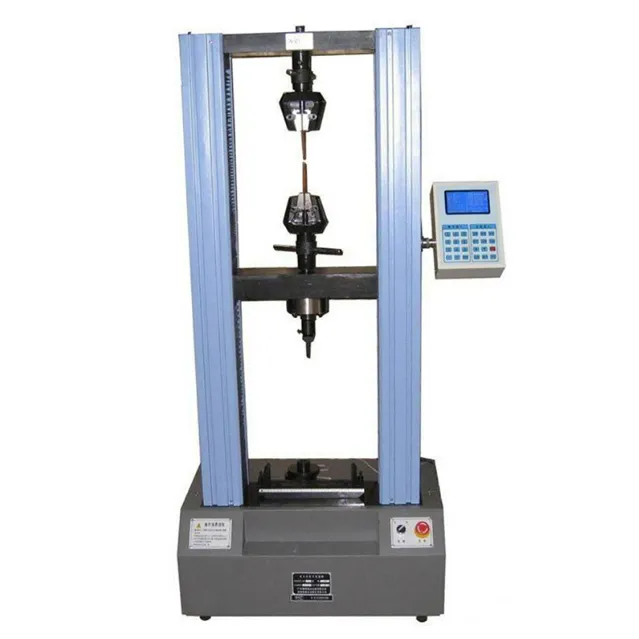High-Precision Tensile Testing Machine for Reliable Material Strength Analysis
Material strength testing is essential for ensuring product quality, safety, and compliance with industry standards. Our advanced Tensile Testing Machine delivers accurate and repeatable results, making it the perfect solution for manufacturers, research laboratories, and quality control departments.

The Working Principle of Tensile Testing Machine
A Tensile Testing Machine operates on the fundamental principle of applying a controlled force to a material sample until it reaches its breaking point. This process measures the material’s tensile strength, elongation, and other mechanical properties.
During testing, the sample is securely clamped between two grips—one fixed and one movable. The Elektroniczna maszyna do próby rozciągania then applies a unidirectional force at a precise speed, gradually stretching the material. As the force increases, sensors collect real-time data on the material’s behavior, including stress, strain, and ultimate tensile strength.
With its high-precision load cells and advanced control system, the Universal Tensile Testing Machine ensures accurate and reliable test results across various materials, including metals, plastics, textiles, and composites.
The Benefits of Tensile Testing Machine with High-Precision Full Digital Speed Control System
One of the key advancements in modern Tensile Strength Testing Equipment is the integration of a high-precision full digital speed control system. This feature enhances the accuracy, stability, and repeatability of tensile tests, providing significant advantages for manufacturers and research institutions.
Traditional tensile testing machines often suffer from inconsistencies in speed control, leading to unreliable results. In contrast, our Universal Tensile Testing Machine is equipped with a full digital speed control system that allows precise adjustments to the test speed, ensuring uniform force application across different test conditions.
This level of control is particularly beneficial for industries that require strict adherence to international testing standards. Whether testing the tensile strength of automotive components, medical devices, or construction materials, the Tensile Strength Testing Equipment delivers unmatched precision and repeatability.
Additionally, the digital control system minimizes mechanical wear and tear, extending the lifespan of the Elektroniczna maszyna do próby rozciągania and reducing maintenance costs over time.
Tensile Testing Machine: How to Analyze the Data of Tensile Testing
Accurate data analysis is essential for interpreting tensile test results and making informed decisions about material quality. The Tensile Testing Machine simplifies this process with advanced data acquisition and analysis software.
Once a test is completed, the Universal Tensile Testing Machine generates a detailed report that includes essential parameters such as:
- Tensile Strength: The maximum force the material can withstand before breaking.
- Yield Strength: The stress level at which the material begins to deform permanently.
- Elongation: The percentage increase in length before the material fractures.
- Modulus of Elasticity: The material’s stiffness, indicating how much it stretches under load.
The Tensile Strength Testing Equipment allows users to visualize data through real-time graphs and automated calculations. By comparing results across different materials and batches, manufacturers can ensure consistent product quality and compliance with industry regulations.
Upgrade Your Testing Capabilities with a High-Performance Tensile Testing Machine
For industries that demand precision, reliability, and efficiency in material testing, our Tensile Testing Machine is the ultimate solution. With its full digital speed control system, high-precision load sensors, and intelligent data analysis software, it delivers superior performance for a wide range of applications.
Whether you need a Universal Tensile Testing Machine for research and development or a durable Elektroniczna maszyna do próby rozciągania for routine quality control, our cutting-edge technology ensures accurate and repeatable results every time. Invest in the best Tensile Strength Testing Equipment today and take your material testing to the next level.
Tensile Testing Machine FAQs
How does a Tensile Testing Machine work?
A Tensile Testing Machine applies a controlled force to stretch a material sample until it breaks. This process measures key properties such as tensile strength, yield strength, and elongation.
Why is a full digital speed control system important in a Universal Tensile Testing Machine?
It ensures precise force application, improves test accuracy, and enhances repeatability, making the results more reliable for material analysis.
What materials can be tested with an Elektroniczna maszyna do próby rozciągania?
It can test metals, plastics, rubber, textiles, composites, and other materials used in industries such as aerospace, automotive, and construction.
How does the Tensile Strength Testing Equipment analyze test data?
It records parameters like tensile strength, elongation, and yield strength, providing real-time graphs and automated calculations for easy data interpretation.
Why should manufacturers invest in a high-precision Tensile Testing Machine?
It ensures product quality, improves manufacturing efficiency, meets industry standards, and reduces material defects, leading to overall cost savings and better product performance.
-
Why the Conductor Resistance Constant Temperature Measurement Machine Redefines Precision
AktualnościJun.20,2025
-
Reliable Testing Starts Here: Why the High Insulation Resistance Measuring Instrument Is a Must-Have
AktualnościJun.20,2025
-
Flexible Cable Flexing Test Equipment: The Precision Standard for Cable Durability and Performance Testing
AktualnościJun.20,2025
-
Digital Measurement Projector: Precision Visualization for Modern Manufacturing
AktualnościJun.20,2025
-
Computer Control Electronic Tensile Tester: Precision and Power for the Modern Metal Industry
AktualnościJun.20,2025
-
Cable Spark Tester: Your Ultimate Insulation Assurance for Wire and Cable Testing
AktualnościJun.20,2025
 Copyright © 2025 Hebei Fangyuan Instrument & Equipment Co.,Ltd. All Rights Reserved. Sitemap | Privacy Policy
Copyright © 2025 Hebei Fangyuan Instrument & Equipment Co.,Ltd. All Rights Reserved. Sitemap | Privacy Policy
